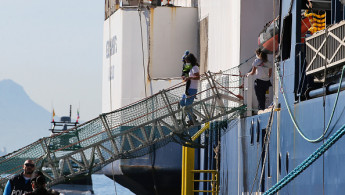German rescue ship defies Italy over migrant disembarkation rules
German charity Mare*Go said on Friday it had challenged migrant disembarkation rules introduced by Italian Prime Minister Giorgia Meloni's right-wing administration as part of its crackdown on NGO sea-rescue activities.
Mare*Go said it disobeyed instructions to take 36 migrants it picked up on Thursday to the Sicilian port of Trapani, taking them instead to Lampedusa island, saving itself hours of navigation.
Noting that Trapani was 32 hours away from its location, the NGO said on Twitter: "We clearly communicated to the authorities that #MareGo is not equipped to treat the rescued people on the move for that period of time".
Earlier this year, the Italian parliament passed a law requiring charity-run ships to head to port immediately after a rescue, preventing them from carrying out multiple operations at sea.
Italian authorities have also started a practice of instructing ships to head to more distant ports, not just in Sicily but further up the Italian peninsula, in some cases hundreds of kilometres away.
Charities that do not comply with the rules risk fines and the impounding of their vessel.
In March, a rescue ship funded by British street artist Banksy was seized in Lampedusa after Italy's coast guard said the boat had disobeyed its orders to head to Sicily and instead went to look for more migrants in distress.
Meloni said in December the clampdown on charity ships was needed to stop them acting as "ferry boats" for migrants, going "back and forth with human traffickers to shuttle people from one country to the other".
Her government's new rules, however, have failed to curb sea migration inflows. Around 50,400 landings have been recorded so far this year, up from around 19,700 in the same period of 2022.





 Follow the Middle East's top stories in English at The New Arab on Google News
Follow the Middle East's top stories in English at The New Arab on Google News


